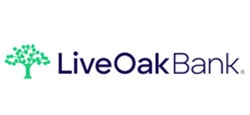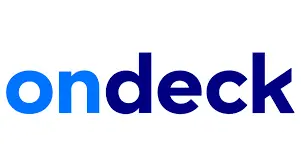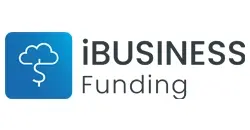Starting a franchise with no money is challenging, but not impossible. Research franchises with small fees — like those less than $20,000. Check to see what loan options you can get directly from the franchise company, but also consider loans from banks and SBA lenders. If you can’t meet the criteria for traditional financing, you could consider an online lender or a bad credit business loan.
Best Franchise Loans in February 2026
Compare top lenders to find funding for your franchise.
Live Oak Bank: Best for SBA franchise loans
- SBA Preferred Lender
- Low, capped interest rates
- No prepayment penalties
- No physical branches
- Doesn’t disclose specific interest ranges
- Long time in business requirement
Why we picked it
An SBA 7(a) loan from Live Oak Bank provides up to $5,000,000 for business acquisitions, partner buyouts, commercial real estate and more. Thanks to its SBA Preferred lender status, Live Oak Bank can process and fund your franchise purchase loan three to four weeks faster than non-Preferred lenders.
You can also receive individual support from a dedicated business analyst to guide you through the entire loan process.
If you need to cover large purchases, Live Oak Bank’s SBA 504 loan goes up to $15,000,000. All SBA loans must follow SBA guidelines, such as capped interest rates and fees.
How to qualify
In order to qualify, you’ll need to meet Live Oak Bank’s criteria of:
- Minimum credit score: 650
- Minimum time in business: 3 years
- Minimum annual revenue: $250,000
Fundbox: Best for new franchises
Ratings and reviews are from real consumers who have used the lending partner’s services.
Up to $250,000
4.66% to 8.99%
4.66% for 12-week terms
8.99% for 52-week terms
3 or 12 months
- Short time in business requirement
- Next-day funding available
- Flexible eligibility requirements
- Low funding amounts compared to other lenders
- Short repayment terms
- Doesn’t list full range of interest rates
Why we picked it
If you’re looking for franchise startup loans, Fundbox’s line of credit could be a good fit. While other lenders typically require a one- to two-year business history, Fundbox works with early-stage startups after just three months of operation.
You can apply online and get a decision in minutes — with funds hitting your business bank account as soon as the next day.
Note that Fundbox’s loan amounts and repayment terms are limited compared to other lenders. In addition, its lowest interest rates are typically reserved for high-credit borrowers, with no details on Fundbox’s maximum rates.
How to qualify
In order to qualify, you’ll need to meet Fundbox’s criteria of:
- Minimum credit score: 600
- Minimum time in business: 3 months
- Minimum annual revenue: $30,000
American Express Business Line of Credit: Best for flexible lines of credit
$2,000 to $250,000
3.00% to 27.00%
3% to 9% for 6-month terms
6% to 18% for 12-month terms
9% to 27% for 18-month terms
12% to 18% for 24-month terms
6 to 24 months
- Borrow what you need when you need it
- Quick application process
- Low monthly revenue requirement
- Confusing fee structure
- Requires a personal guarantee and collateral
- Must link business bank account to application
Why we picked it
Once you get your franchise up and running, you may want access to a business line of credit for ongoing expenses like advertising, payroll services, expansions and more. The American Express Business Line of Credit lets you withdraw up to your credit limit as often as needed. And after repaying the debt, you can withdraw again and again.
However, American Express counts each draw as a new installment loan, with a confusing fee structure and short repayment terms.
Current American Express Card members might be eligible for a pre-approval offer — log into your account to see if you qualify.
How to qualify
In order to qualify, you’ll need to meet American Express’s criteria of:
- Minimum credit score: 660
- Minimum time in business: 12 months
- Minimum annual revenue: $36,000
OnDeck: Best for online term loan
Ratings and reviews are from real consumers who have used the lending partner’s services.
$5,000 to $400,000
35.26% APR Minimum APR offered to at least 5% of customers (not the lowest rate offered)
Up to 24 months
- Large borrowing amounts
- Fair to low credit accepted
- On-time payments help build business credit
- High interest rates
- Does not lend to businesses in North Dakota
- Requires daily or weekly repayments
Why we picked it
OnDeck can be a great choice for franchise owners wanting a business term loan with flexible eligibility requirements and minimal paperwork — all accessible online. You can borrow up to $400,000 to cover inventory, equipment or expansions, with no penalty for repaying your debt early.
Since OnDeck reports to the major business credit bureaus, on-time payments can help establish and strengthen your business credit profile.
How to qualify
In order to qualify, you’ll need to meet OnDeck’s criteria of:
- Minimum credit score: 625
- Minimum time in business: 12 months
- Minimum annual revenue: $100,000
iBusiness Funding: Best for established franchises
- Fast funding
- Transparent requirements
- No prepayment penalties
- Charges origination fees
- Collateral and personal guarantee required
- Not ideal for startups
Why we picked it
Previously known as Funding Circle, iBusiness Funding is ideal for established companies with reliable revenue and solid credit. If eligible, you can access up to $500,000 for your franchise’s working capital expenses or to refinance business debt. With a quick and easy online application, funds could be delivered as quickly as two business days.
Note that origination fees can range from 4.49% to 10.49%, with APRs as high as 52.40%. You will also need to provide collateral and a personal guarantee, although there are no penalties for repaying your loan ahead of schedule.
How to qualify
In order to qualify, you’ll need to meet iBusiness Funding’s criteria of:
- Minimum credit score: 640
- Minimum time in business: 24 months
- Minimum annual revenue: $50,000
National Funding: Best for fast funding
Ratings and reviews are from real consumers who have used the lending partner’s services.
$5,000 to $500,000
1.11 factor rate
4 to 24 months
- Receive funds in as little as 24 hours
- Early payoff discount
- Short business history required
- High annual revenue requirement
- Daily or weekly repayments required
- Factor rate makes it hard to compare against competitors
Why we picked it
National Funding is one of our top picks for fast business loans with a simple application process, no down payment or collateral required and a turnaround time as quick as 24 hours. Term loans go up to $500,000 with flexible repayment terms, plus a discount if you repay your debt early.
Note that National Funding charges a factor rate instead of standard interest, making it hard to compare against other offers. If possible, convert the rate before proceeding to ensure you understand the total cost involved.
How to qualify
In order to qualify, you’ll need to meet National Funding’s criteria of:
- Minimum credit score: 670
- Minimum time in business: 6 months
- Minimum annual revenue: $250,000
Taycor Financial: Best equipment financing
Ratings and reviews are from real consumers who have used the lending partner’s services.
$500 to $2,000,000
4.99%
12 to 84 months
- 100% financing for equipment
- Fast funding
- Flexible eligibility requirements
- Requires a documentation fee
- Equipment financing rates can go as high as 28.00%
- Stricter criteria for equipment refinancing
Why we picked it
If you need to purchase or upgrade essential equipment for your franchise, Taycor Financial offers 100% equipment financing up to $2,000,000. Since the purchased equipment acts as collateral to reduce lender risk, Taycor’s eligibility criteria tends to be more lenient — making this an ideal option for brand-new startups and bad-credit borrowers.
Taycor Financial also offers term loans, lines of credit, accounts receivable factoring, equipment leasing and more. But be aware that interest rates go up to 28.00% or higher for some products.
How to qualify
In order to qualify for equipment financing, you’ll need to meet Taycor Financial’s criteria of:
- Minimum credit score: 550
- Minimum time in business: Not required
- Minimum annual revenue: No specific minimum
What is a franchise loan?
A franchise loan is a form of business financing that helps entrepreneurs launch a franchise. The loan typically covers franchise fees and other startup costs associated with opening a franchise.
Although franchise financing can make the high cost of buying a franchise more manageable, many lenders require applicants to have a specific amount of liquid assets. Companies may also have personal net-worth requirements for applicants.
Frequently asked questions
Yes, banks and credit unions do give loans to franchisees. Research the financial institution of your choice to understand their business loan requirements before you apply.
To get a franchise loan, you need to be a successful entrepreneur with a good to excellent credit score, healthy finances that include liquid assets, a detailed business plan and a positive net worth.
While each lender has its own requirements, you’re more likely to get approved and secure a competitive rate if you have a decent amount of capital to invest in the franchise. And having a proven track record of turning profits can help seal the deal.









